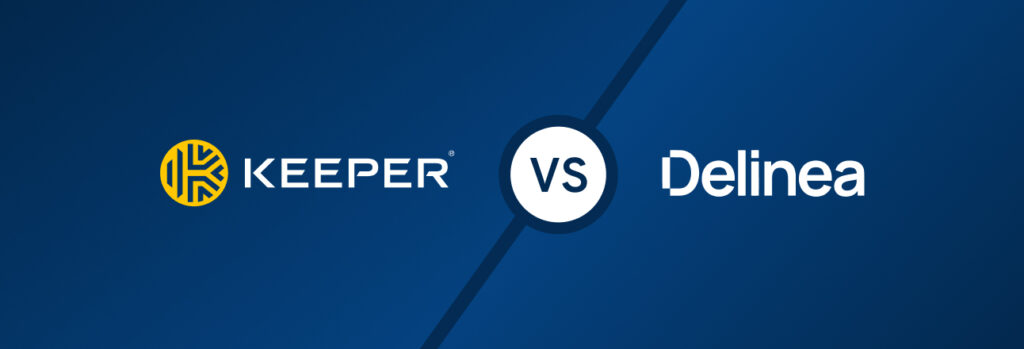An authenticator app is a method of Multi-Factor Authentication (MFA) that adds an extra layer of security to your online accounts. Keeper® can be used in
The main difference between Keeper and Delinea is their focus on Privileged Access Management (PAM). While both platforms offer PAM solutions, Keeper stands out as the superior choice. It provides a more comprehensive cybersecurity solution that includes password management, remote access and privileged access management, whereas Delinea only offers a PAM solution.
What Is a PAM Solution?
Privileged access management (PAM) uses cybersecurity strategies, tools, and technologies to control access permissions for users and systems across an IT environment. The goal is to hone in on privileged access controls to mitigate the risks of a cyber attack.
According to the 2021 Privileged Access Management Solutions Market Offering, the global PAM solutions market size was valued at $2.47 billion in 2020 and is projected to reach $19.73 billion by 2030.
Keeper vs Delinea: Comparing Secrets Management Services
Although Keeper is most well-known for its top-rated password manager, our platform also offers several online security services outside of password management. Both Keeper and Delinea offer secrets management and remote desktop connection solutions. So, how do their services stack up? Let’s take a look at secrets management and examine what each company offers.
What Is Secrets Management?
Secrets management is exactly what it sounds like: the managing of “secrets,” or confidential pieces of information within an IT environment that are typically used by applications and machines, as opposed to human users. Secrets are often used for authentication or as input to a cryptographic algorithm. Examples of secrets include SSH keys, database and other system-to-system passwords, and API and other application keys and credentials — including those used within containers, CI/CD systems, automation processes and remote desktop protocol (RDP) software. Privileged account credentials are also considered secrets.
Keeper Secrets Manager
Keeper Secrets Manager is a cloud-based, zero-knowledge solution for securing infrastructure secrets such as API keys, database passwords and other sensitive information.
Our secrets manager solution offers tools and capabilities to help your team be productive and efficient while protecting you from cyber threats. With Keeper Secrets Manager, you can:
- Manage employee permissions with role-based access controls
- Consolidate secrets into your infrastructure, containers and build systems
- Integrate your secrets in a unified platform with a complete audit trail
- Automate the rotation of passwords, access keys and certificates
- Manage and store an unlimited number of secrets, applications and environments
Delinea’s Secret Server
Delinea’s Secret Server offers secrets management and other enterprise Privileged Access Management (PAM) solutions that can protect privileged accounts.
With Secret Server, IT administrators can:
- Provide each employee with a secure vault — Employees can store and manage privileged credentials in an encrypted, centralized, digital vault.
- Delegate access — Set up role based access controls, workflow for access requests and approvals for third parties.
- Control sessions — Implement session launching, proxies, monitoring and recording.
Keeper vs Delinea: Comparing Remote Desktop Services
Digitizing the workplace has led to an influx of offices offering hybrid or remote working opportunities—creating a new standard of how we work. Remote desktop connection manager services are making the transition from the office to the home a little easier on everyone, since they allow employees to access their work desktops from any location.
According to the 2021 Kapersky COVID-19 WFH Report, roughly half (46%) of respondents had never worked from home prior to the pandemic. About one-third (32%) of employees claimed they were now working in less comfortable conditions than they were while in office environments, and 68% admitted to using their personal computer to perform work for their employer.
Mixing your personal and work data can quickly get confusing, and it poses security risks. Remote desktops solve these problems. They allow employees to connect to their work machines and save files on the company network, avoiding the need to save work-related files to personal machines.
How Keeper Connection Manager Is Enabling Remote Work
Keeper Connection Manager is a remote desktop solution that allows employees secure access to remote desktop protocol (RDP), secure shell (SSH), MySQL and Kubernetes endpoints through any web browser. Built atop the open-source Apache Guacamole platform, Keeper Connection Manager deploys quickly, with only three simple steps:
- Setup — Set up Keeper Connection Manager on your network, whether on-premise or in the cloud.
- Connect — Easily connect to a machine from anywhere using your web browser.
- Integrate — Designed to be integrated with many third-party systems and protocols.
Once you’ve set up Connection Manager, this platform allows you to:
- Record sessions — Keep track of privileged user access.
- Track and audit — Produce audit trails for compliance purposes.
- Improve productivity — Switch between active sessions, or launch a new session in a separate tab.
Want to try it out for yourself? Sign up for a 14-day free trial and get started today.
How Does Delinea Connection Manager Hold Up?
Delinea Connection Manager allows users to manage and interact with multiple remote desktop and SSH sessions. With Delinea Connection Manager, you can also do many of the same things as Keeper Connection Manager such as record sessions, track and produce audits and improve your team’s productivity.
Keeper vs Delinea: Features and Services
While Delinea is a PAM solution, Keeper is an all-in-one enterprise cybersecurity solution. Both platforms offer additional services dedicated to protecting your organization and its team members.
Apples to apples, Keeper is clearly the better value, with more security solutions than Delinea, and a clear pricing structure.
Keeper’s least-privilege role permissions allow teams to share privileged accounts and folders easily and securely. Admins can set up role-based access controls (RBAC) to limit user permissions and access according to each user’s individual role.
Choose Keeper to Be Your Enterprise Security Solution
Delinea focuses specifically on providing PAM solutions, while Keeper offers a more comprehensive cybersecurity package focused on password management, remote access and privileged access management. Stolen credentials lead to over 80% of successful data breaches, making comprehensive password and privileged access security essential to protecting your company from cyber attacks.
Interested in learning more about Keeper’s enterprise password management and PAM solution? Get in touch with our team and request a demo.
Frequently Asked Questions
IAM vs PAM: What’s the difference?
Identity and access management (IAM) is a set of policies and technologies that focuses on controlling users’ access to applications and information within the organization. Privileged Access Management (PAM) focuses on protecting privileged accounts. Privileged accounts are provided only to a small number of users who require access to backend systems, databases and confidential information.
IAM focuses on authorizing users who need access to general systems and data while PAM focuses on access rights to highly sensitive systems and data.
What is least-privilege access?
Least privilege, often known as the principle of least privilege (PoLP), refers to the practice of restricting access rights for users, accounts, and processes to only what is absolutely necessary.
What are the benefits of privileged access management?
Privileged access management (PAM) provides control over elevated (“privileged”) access and permissions for users, accounts and systems across an IT environment. PAM is used to restrict access to an organization’s most sensitive information and systems.
Some of the benefits of PAM include:
- Controlling access to privileged accounts — Access to an organization’s most sensitive systems must be limited to as few people as possible.
- Reducing cyber attacks — Privileged credentials are often targeted by both external threat actors and malicious insiders, including current and former employees. PAM enables administrators to grant access on an as-needed, time-limited basis and easily revoke user privileges when the employee no longer needs them, or they leave the company.
- Monitoring suspicious activity — PAM solutions provide admins with real-time notifications of suspicious activity, such as failed logins, shared information, vault transfers, admin changes and more.
 Comparison
Comparison 
